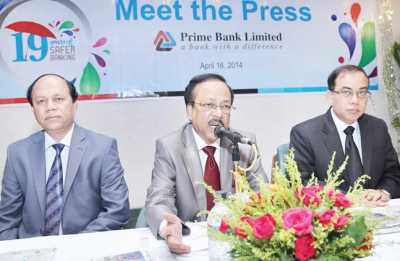Banking
Challenges for new banks
Over the past decade, Bangladesh economy enjoyed favourable economic environment and grew at approximately 6 percent with tolerable inflation. Major economic indicators like GDP, exports and imports have tripled in the last 10 years; industrialisation and trade have soared to unprecedented heights.
Growth in the “real” economy has fuelled the growth of the country's banking sector which has seen an increase in deposits by over 400 percent and assets by around 500 percent in the last 10 years. Simultaneously, per capita GDP has more than doubled and yet more than half the population is still unbanked.
The central bank's decision to allow licences to nine new banks has the merit. Regardless of political motivations, a logical argument can be made beyond the unbanked population argument that more competition will improve service quality and ultimately benefit the consumers.
From the sponsors standpoint, a logical argument can be made about the potential economic benefit for the sponsors based upon past record, which is estimated to be 25 percent+ over 10 years from inception of a bank approximately 15 percent higher than the risk free rate in Bangladesh.
Past performance do not guarantee future returns
These all sound great theoretically but the ground reality is different, and challenges faced by the management and shareholders of new banks cannot be minimised. The banking industry is already highly competitive. Therefore, unless these new banks get their act together fast, shareholders could suffer a major setback and even some could face extinction.
Show me the money
Let us refresh our memory about how banks make profit. Banks make money primarily in three ways. Firstly, from the spread between the deposit and lending rates; Secondly, from the fees they charge for various products and services, and thirdly from proprietary investments.
This is obviously overly simplified; however, all these modes of earnings potential are possible to some extent provided that the demand is growing, banks are well capitalised and have the proper human resource; and the rest happens automatically. So what are the challenges?
It is all about people
At present, the banking sector is suffering from an acute shortage of skilled and adept professionals.
Except for a few foreign and local banks, unfortunately the quality of staff beyond the CEO, managing director and DMD levels drops drastically. Depth and breadth of knowledge unfortunately is poor. This is an ominous sign for the industry since professional human resource is essential for the growth and development of the industry. These weaknesses obviously facilitate frauds, mismanagement, and value destruction for shareholders and encourage and breed substandard corporate governance culture in the financial sector.
The first challenge for new banks will be attracting the right leadership. It will not be easy to attract talents for a newly established entity. The most likely outcomes are - either you end up recruiting an unqualified team due to budget constraints or you end up paying a significant premium for talents.
If you recruit weak managers, then they end up attracting even weaker subordinates and we all know how that works.
Attracting deposits
While most banks offer similar commodity type products, they are combating with each other in most cases on price/yield, realistically, the new entrants can gain an initial advantage and capture market share by offering higher deposit rates.
Falling deposit rates at present driven by recent political uncertainty, risk averseness, lack of demand for loans and recent spike in demand for short-term government securities provide a lower rate environment, nevertheless provide no relative advantage to the new banks.
Lending to the right clients
Contrary to popular believe that aggressive marketing or in this case aggressive lending may help quickly capture market share and drive banks' profitability, in reality success of these new banks in the long-run depends on ensuring that they lend to the right clients. Most of us are aware of the result of aggressive growth in the lending portfolios.
As a lender, you only get the stated interest and the principal within the maturity date at best and you have no upside like equity investors. This is why one must wonder why many banks even today lend to entities with no real capital or a sliver of capital created from revaluation and other financial engineering.
If the new banks fall into this temptation, this could be the first nail in the coffin. Chasing yield and risking principal is the fastest way to go bankrupt.
Tapping the untapped
With around half the population unbanked, the biggest opportunity for new banks exists for targeting unbanked rural populations with the right products and services. Opening cost-efficient branches and nimble service centres in suburban and rural areas can substantially boost asset size and simultaneously, bring the much-needed diversification that every lender requires to spread-out its risk.
Last mover advantage
Despite the challenges, new banks have some vantage points comparing to the existing banks. Currently the industry maintains NPL of 8.93 percent+, which is similar to the levels back in 2007. While all the other government and private commercial banks have been working hard to clean their books, new banks have the luxury to formulate carefully thought-out strategies for market penetration.
It is a well-established fact that many of the existing players are required to recapitalisation to maintain minimum capital adequacy. It is a daunting challenge to concentrate both on business expansion and recapitalisation effectively.
For the past 10 years, in the backdrop of consistent economic growth driven by export and remittance, balance sheets of banks have inflated due to aggressive lending, stockmarket and real-estate bubble and finally the head-wind; the sector is now facing serious challenges due to poor balance sheet. All these incidents provide a roadmap of do's and don'ts for a new bank.
Embracing new technology
The biggest advantage for a new bank is the opportunity to embrace technologies to get an edge over the existing players. We expect disruptive technologies to impact banking globally and also, to some extent, in Bangladesh.
For instance, mobile technology now provides the plumbing for delivering products and services unthinkable even a few years back. In Bangladesh, more than 70 percent of the population lives in rural areas, where financial services are generally inaccessible. Furthermore, with the advent of 3G technology in Bangladesh, internet penetration promises to grow exponentially in the coming years.
Lessons can be learnt from organisations such as bKash, which has proven how financial services can be delivered conveniently and at a low-cost. We believe this is just the beginning and more game-changing technologies are expected.
As a proponent of a free market, increased supply of banks is generally good for the consumers. However, the road to success is not smooth at all and expected to be even more challenging in the future. Now it is not an option but essential to invest in intellectual capital, attracting deposits at competitive rates, focusing on unbanked population, selecting right clients, learning from past mistakes, embracing new technology, and most importantly developing effective leadership.
How well these banks execute on these dimensions will finally determine the fate of these banks in the future.
ONE Bank opens two branches in Chittagong

ONE Bank Limited inaugurated its Anderkilla and Anowara branches in Chittagong recently.
Zahur Ullah, Chairman of Executive Committee of the bank inaugurated the branches, said a press release.
Chowdhury Hasan Mahmud Hasni, Panel Mayor of Chittagong City Corporation, Abu Sufiyan, President of Chittagong Press Club, M A Malek, Editor of Daily Azadi, Kazi Rukunuddin Ahmed, Sayed Nurul Amin, Directors, M. Fakhrul Alam, Managing Director and senior executives of the bank were present also present.
Mutual Trust Bank holds anti-money laundering confce
.jpg)
Mutual Trust Bank Limited organised Branch Anti-Money Laundering Compliance Officers’ (BAMLCO) Conference-2014 on Anti-Money Laundering and Combating the Financing of Terrorism.
A total of 140 participants including 94 MTB branche officials attended the conference at the Bangladesh Academy for Rural Development (BARD) in Comilla recently, said a press release.
Prime Bank marks 19th anniversary

Prime Bank Limited celebrated its 19th anniversary at a city hotel on Wednesday.
To mark the occasion a press conference was organized by the bank, said a press release.
Md. Ehsan Khasru, Managing Director and CEO of the Bank spoke at the press conference. Quazi A.S.M. Anisul Kabir and Habibur Rahman, Deputy Managing Directors and senior officials of the bank were present.
Md. Ehsan Khasru thanked the shareholders, customers and well wishers of the bank for their support towards the bank for reaching the current position.
Md. Ehsan Khasru said, Prime Bank is going to create a milestone this month by being included with the fourth largest credit card brand of the world known as JCB, in the Bangladeshi market solely. Not only that the bank is also going to launch a Retail Loan Product like Home Treasure.
Under the scheme, the customers will be able to take retail loans against their mortgaged homes. Moreover, promotional activities with the School Banking “My First Account” and the Biometric Smart Card “Prime Cash” will be launched throughout the year.
UCBL named best emerging markets bank of Bangladesh
United Commercial Bank has been named as the Best Emerging Markets Bank of Bangladesh by the renowned Global Finance magazine based on an exclusive survey to be published in its May 2014 issue.
Global Finance editors — with input from industry analysts, corporate executives and banking consultants—selected the best emerging markets bank in the Asia-Pacific region and in 30 countries.
Criteria for choosing the winners included growth in assets, profitability, strategic relationships, customer service, competitive pricing, and innovative products.



